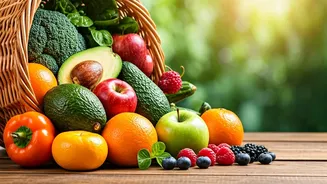Embrace Soluble Fiber
Soluble fiber, a dietary superstar, works by binding to cholesterol in the digestive system, preventing its absorption into the bloodstream. Think of it as
a natural cleanser that helps your body get rid of excess cholesterol. Foods rich in soluble fiber include oats and oat bran, which can be easily incorporated into your breakfast routine with a bowl of oatmeal. Moreover, barley is another excellent source; it can be used as a substitute for rice in various meals. Legumes such as kidney beans, lentils, and chickpeas are also brimming with soluble fiber, making them perfect additions to soups, stews, or salads. Consuming these fiber-rich foods regularly can lead to a noticeable drop in your LDL (bad) cholesterol levels, contributing to improved heart health. The recommendation is to include at least 5 to 10 grams of soluble fiber per day, ensuring consistent consumption for optimal benefits. Remember that dietary changes should always be implemented along with consulting a healthcare professional for personalized guidance.
Fatty Fish Powerhouse
Fatty fish, such as salmon, mackerel, tuna, and sardines, are packed with omega-3 fatty acids, which have a remarkable ability to lower triglycerides, a type of fat found in the blood. They also help raise HDL (good) cholesterol, contributing to better overall cholesterol balance. These omega-3s are beneficial for heart health and reduce inflammation throughout the body. Aim to eat at least two servings of fatty fish per week. Consider grilling, baking, or poaching fish to maintain its nutritional integrity. When cooking, minimize the use of added fats, such as butter or oil, to keep the meal heart-healthy. Besides the direct impact on cholesterol, the consumption of fatty fish offers other advantages, including improved brain function and reduced risk of chronic diseases. For those who do not prefer fish, omega-3 supplements can be an alternative, but consulting a doctor before using them is advised to ensure proper usage and dosage.
Nuts and Seeds Benefits
Nuts and seeds, such as almonds, walnuts, flaxseed, and chia seeds, are your allies in the fight against high cholesterol. They contain healthy fats, fiber, and plant sterols that actively help lower LDL cholesterol. Walnuts, in particular, are rich in omega-3 fatty acids, adding another layer of heart-healthy benefits. Enjoy a small handful of nuts or seeds as a snack, add them to your breakfast cereals, or sprinkle them over salads. However, portion control is key, as nuts and seeds are calorie-dense. A typical serving is about 1.5 ounces of nuts per day. Flaxseed and chia seeds can be incorporated into smoothies or sprinkled over yogurt. It is important to choose unsalted and unroasted nuts and seeds whenever possible to avoid added sodium and unhealthy fats. These additions provide a delightful crunch and boost the nutritional value of your meals, making healthy eating more enjoyable and sustainable.
Olive Oil Advantages
Olive oil, especially extra virgin olive oil, is a staple in the Mediterranean diet and is known for its heart-healthy properties. It is rich in monounsaturated fats, which help lower LDL cholesterol while maintaining or even increasing HDL cholesterol levels. Olive oil also contains antioxidants, which protect against cellular damage. Use olive oil as a primary cooking oil and as a dressing for salads and other dishes. When cooking, choose a low to moderate heat setting to preserve the oil's beneficial compounds. Opt for extra virgin olive oil for its richer flavor and higher antioxidant content. Be mindful of portion sizes, as olive oil is high in calories. A good recommendation is about two tablespoons daily. Including olive oil in your diet is a simple yet effective way to improve your cholesterol levels and support overall cardiovascular health. It can also enhance the taste of your food, making healthy eating a more enjoyable experience.
Plant Sterols Fortification
Plant sterols and stanols are naturally occurring substances found in plants, which are very similar to cholesterol. They work by blocking the absorption of cholesterol in the digestive tract. Many foods are fortified with plant sterols, including certain brands of orange juice, yogurt, and margarine. Reading food labels carefully can help you identify these enriched products. Adding these foods to your diet can lead to a significant reduction in LDL cholesterol levels. For optimal results, aim to consume at least 2 grams of plant sterols per day. Plant sterols are an excellent addition to a cholesterol-lowering diet; however, they are most effective when combined with other dietary changes and a healthy lifestyle. Before making major changes to your diet, consult your healthcare provider to tailor a plan that works best for your individual needs. This will ensure you reap all the benefits.















